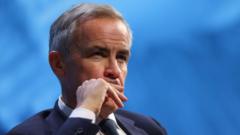The landscape of Canadian politics is shifting dramatically as Mark Carney, the former governor of both the Bank of Canada and the Bank of England, announces he is "considering" a potential candidacy to replace Justin Trudeau as the leader of the Liberal Party. Trudeau's decision to step down after nearly a decade in office comes in light of mounting criticism from within his own party, compounded by troubling polling results.
At 59, Carney emerges as a prominent name among contenders, which includes his former deputy Chrystia Freeland and current Transport Minister Anita Anand. Although Trudeau has committed to remain in his position until a successor is appointed, the Canadian parliament is currently prorogued and will reconvene on March 24. The timeline for selecting a new leader is still unknown, but the Liberals aim to have this resolved before the end of the prorogation. Trudeau has promised a "robust, nationwide, competitive process" for his party's leadership.
Carney, who now heads a successful asset management firm and has acted as an advisor to Trudeau, shared with the UK's Financial Times that he will be making a careful decision alongside his family in the coming days. Despite being a frontrunner due to his extensive economic experience, his lack of prior public office experience raises questions about his potential campaign.
His contributions as a central banker, especially during the global financial crisis and the transition of the UK post-Brexit, have positioned him as a key player in economic discussions. He is also an environmental advocate, having served recently as the United Nations special envoy for climate action. Carney's pro-Liberal stances, including support for the controversial federal carbon tax, have polarized public opinion, particularly among conservative voters.
Given the political climate, his entry into the leadership race could be expedited. The next federal election in Canada is slated for October; however, it’s anticipated that a vote may be called sooner, especially with the Conservative Party, led by Pierre Poilievre, currently holding a substantial lead in opinion polls. Trudeau has previously acknowledged his effort to bring Carney into his cabinet, emphasizing his potential value to Canada during this critical time.
In addition to Carney, other viable candidates for the leadership include Freeland, who resigned from her cabinet position following a fallout with the prime minister’s office, and the well-regarded Anand. The future direction of the Liberal Party, and indeed the entire nation, is poised for a significant transformation as this leadership race unfolds.
At 59, Carney emerges as a prominent name among contenders, which includes his former deputy Chrystia Freeland and current Transport Minister Anita Anand. Although Trudeau has committed to remain in his position until a successor is appointed, the Canadian parliament is currently prorogued and will reconvene on March 24. The timeline for selecting a new leader is still unknown, but the Liberals aim to have this resolved before the end of the prorogation. Trudeau has promised a "robust, nationwide, competitive process" for his party's leadership.
Carney, who now heads a successful asset management firm and has acted as an advisor to Trudeau, shared with the UK's Financial Times that he will be making a careful decision alongside his family in the coming days. Despite being a frontrunner due to his extensive economic experience, his lack of prior public office experience raises questions about his potential campaign.
His contributions as a central banker, especially during the global financial crisis and the transition of the UK post-Brexit, have positioned him as a key player in economic discussions. He is also an environmental advocate, having served recently as the United Nations special envoy for climate action. Carney's pro-Liberal stances, including support for the controversial federal carbon tax, have polarized public opinion, particularly among conservative voters.
Given the political climate, his entry into the leadership race could be expedited. The next federal election in Canada is slated for October; however, it’s anticipated that a vote may be called sooner, especially with the Conservative Party, led by Pierre Poilievre, currently holding a substantial lead in opinion polls. Trudeau has previously acknowledged his effort to bring Carney into his cabinet, emphasizing his potential value to Canada during this critical time.
In addition to Carney, other viable candidates for the leadership include Freeland, who resigned from her cabinet position following a fallout with the prime minister’s office, and the well-regarded Anand. The future direction of the Liberal Party, and indeed the entire nation, is poised for a significant transformation as this leadership race unfolds.



















